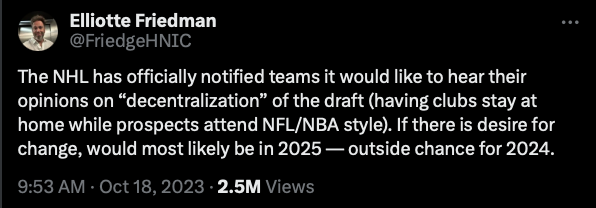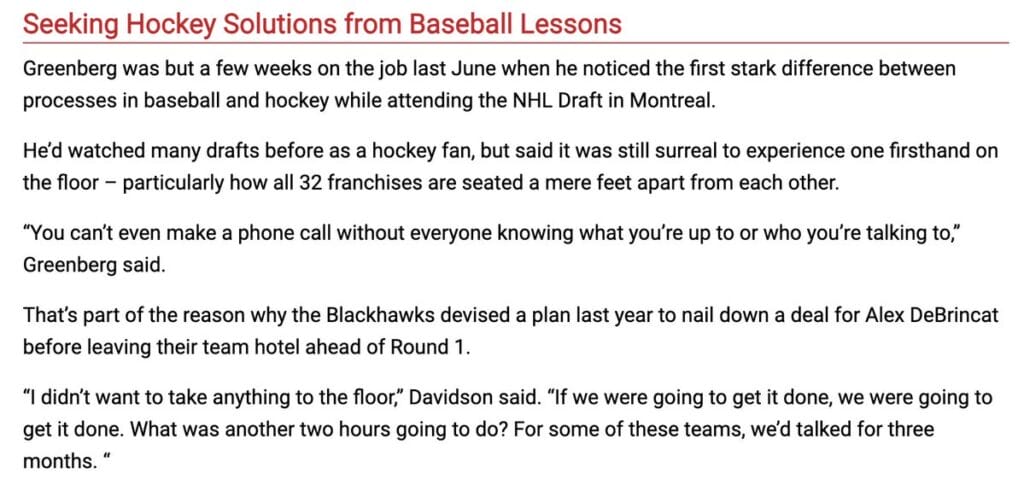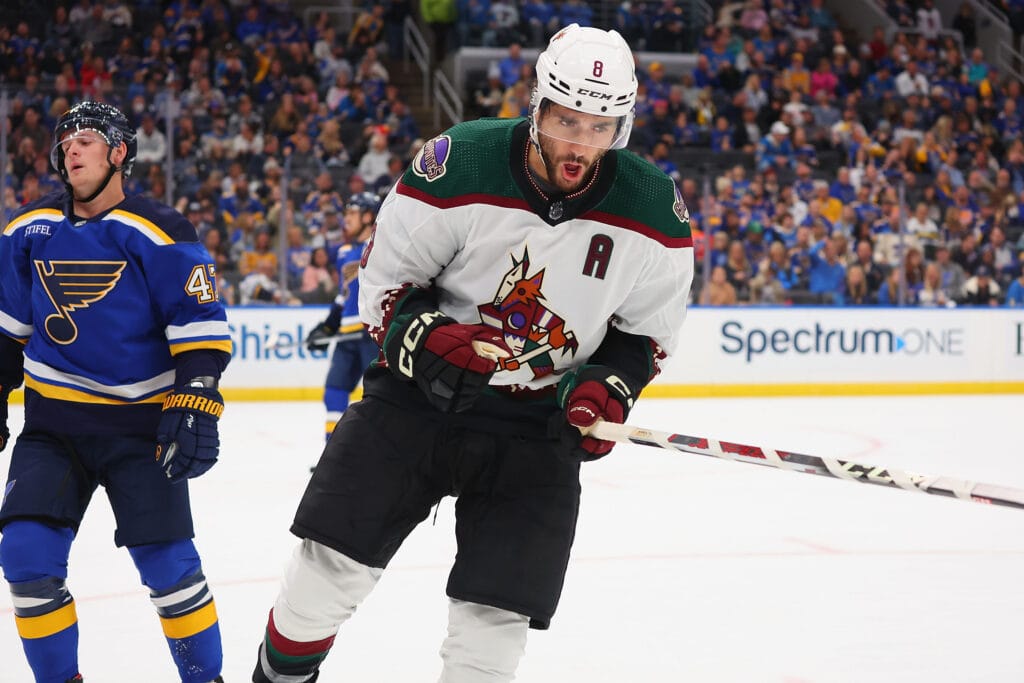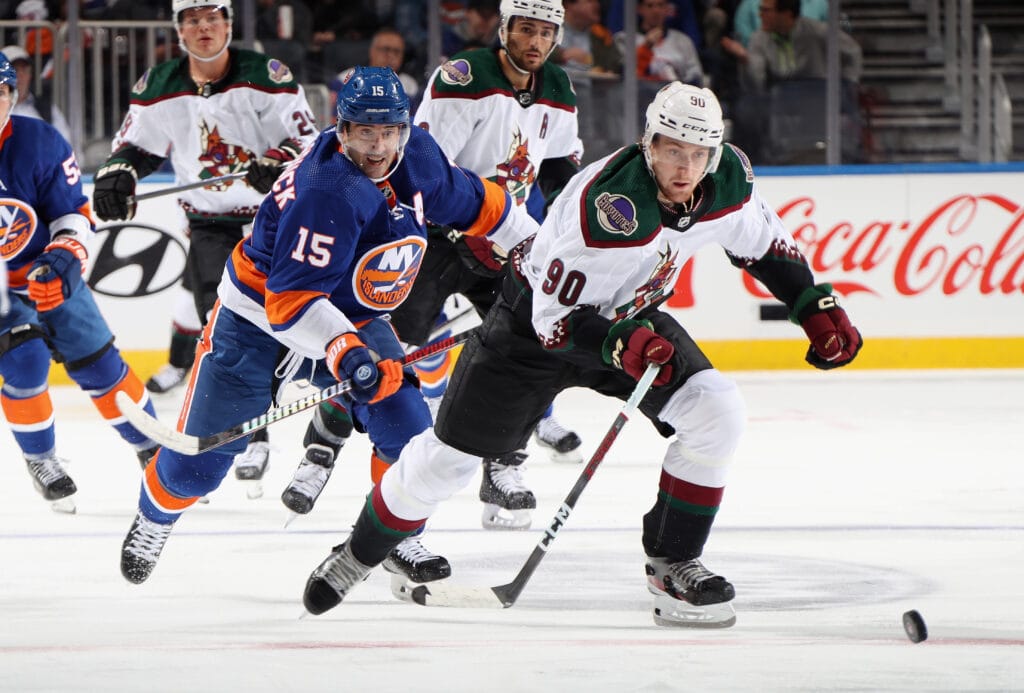© 2026 ALLCITY Network Inc.
All rights reserved.

ST. LOUIS — The news that Sportsnet’s Elliotte Friedman finally put out in the open on Wednesday is news that has been generating a buzz in NHL circles for the past couple of weeks. The NHL is open to changing its draft format from its traditional, everybody-in-one-place format to a decentralized model more closely resembling other major North American sports like the NFL and the NBA.

First, let’s talk about why.
The NHL Draft traditionally falls in late June, giving the teams that advance to the Stanley Cup Final — or more accurately, their staffs — time to prepare. The 2023 Cup Final ended on June 13.
The problem is that free agency generally begins on July 1 so there is not a lot of time to prepare for that equally important part of the NHL calendar.
The 2023 Draft exacerbated those plans. It was held on June 28 and 29 at Bridgestone Arena in Nashville. Three days later, free agency arrived. From an operational standpoint, that’s just too tight a window to shift from one script to another so it’s understandable why governors, managers and scouting staffs would want to alter that plan.
Other concerns have been raised about the current draft-floor model, as Daily Faceoff’s Frank Seravalli detailed in this interview with now-Detroit Tigers GM Jeff Greenberg, who was an executive with the Blackhawks.

I don’t really buy the Greenberg argument. There are easy ways to conceal conversations, whether through technology, texting, barriers or finding a place at the team table at which other tables cannot hear you. The draft floor is loud. Conversations do not carry far and there is a lot of ambient noise that drowns out individual voices. While media cameras and eyes are watching the floor, we are not trained in lip reading. This sounds like paranoia more than anything.
As for the tight window, some have suggested either starting the season a week earlier so the draft can be held a week earlier, or moving the start of free agency back a week. It has always struck me as odd that free agency begins on Canada Day, and runs into the 4th of July.
Why start free agency around holidays? Why not observe those important national holidays and then start free agency on July 8?
Here’s why the NHL should keep the current draft format. It’s unique, it’s personable, it’s charming and it sets the NHL apart from other pro sports leagues in a good way.
The NHL Draft is about connecting. Everybody from GMs, to scouts, to coaches, to players, to former players, to league executives, to broadcast and print media is there. It’s a goldmine for networking and building relationships. It’s face-to-face interaction; the best kind for getting to know other people.
More importantly, it’s a huge day in these drafted kids’ lives. They get their moment in the sun with a chance to meet the entire management, coaching and scouting staffs, while also meeting the local media members who are going to be covering them on a daily basis.
For media, it’s a chance to capture that big moment in all of its colorful and anecdotal glory. Without widespread media attendance, there will be far less color in that storytelling, far less vibe, and no connection to these guys on one of the biggest days of their lives. There will be no chance to get those instant anecdotes or support quotes from family members, friends, old coaches, scouts or other NHL people that bring these picks’ stories to life.
Instead, the draft would turn into the corporate feeling production that is the NFL Draft. The rights holder media would get all the exclusives without enough air time to truly dive deeply into more than a handful of players. There would be volumes of content left on the table. There would be angles that rights holder media wouldn’t even explore as business partners of the league. And a lot of these players’ media moments would be reduced to quick conference calls with reporters in another city, utterly removed from the emotion and vibrance of the moment.
Again, I understand why managers might want the switch. Here’s what one GM (not Bill Armstrong) told me.
“The NHL draft is awesome; my favorite date on the calendar, no question. But from a pure operational standpoint, the new version would be better for teams. Our calendar is so jammed at that time of the year. It would remove travel and give us more time. We back draft right onto free agency and it is jammed up. That’s why I like it.”
That all makes sense, but let’s not forget who the draft is mostly about. It’s not about GMs. It’s not about scouts. It’s not even about fans. It’s about these kids who are living out a dream on an actual stage. Let’s not take a single minute of that spotlight away from them. The current format of the NHL Draft is perfection because it focuses on people, not production.

Road-trip wrap
After less-than optimal performances in two losses to the New York teams, Coyotes coach André Tourigny wanted his team to play faster, execute better and get more pucks to the net in the final game of this four-game road trip on Thursday in St. Louis.
In an effort to shake things up, he juggled his lines, putting Michael Carcone with Nick Bjugstad and Lawson Crouse, while Matias Maccelli moved alongside Logan Cooley and Jason Zucker, and Alex Kerfoot played with Jack McBain and Liam O’Brien.
The Coyotes accomplished all of Tourigny’s goals in a resounding 6-2 win against the Blues. And they added a few more positive points more for good measure.
Arizona scored three 5-on-5 goals to increase its season total from one to four. It scored three power-play goals to increase its success rate to 31.6 percent (No. 3 in the league). The Coyotes got goals from six different players, and Maccelli, Zucker, Juuso Välimäki, Carcone and Bjugstad all recorded their first points of the season. And the Coyotes’ season-long run of superb goaltending continued with a 24-save performance from Connor Ingram, who was at his best when his team needed him most on a late, second-period penalty kill.
The walk-off result was a 2-2 road trip that featured three playoff teams, two Vezina Trophy caliber goalies and four games in the two farthest time zones ticked off the schedule.
“Long training camp, we played a lot [of preseason games] on the road, we start with Devils, Islanders, Rangers and on the way back you play the Blues,” Tourigny said. “It was a tough road trip against really good opponents.
“500? We’ll take that any day, and if you look at the first three games, we all know they were one-shot games. We could have had more than four points on that trip so it will be important for us to regroup and be ready for the home opener.”
The Coyotes won seven games away from Mullett Arena all of last season, finishing with the NHL’s worst road record (7-25-9). Don’t start making playoff plans just yet, but this was an important step for a young team with plenty of new faces.
“We set ourselves up pretty nicely,” Välimäki said. “Now we’ve got to take advantage of it.”

JJ Moser’s role
JJ Moser logged fewer than 15 minutes in every one of the Coyotes’ first three games before logging 17:38 on Thurdsay. That matches the total number of games that he logged fewer than 15 minutes all of last season when he played all 82 games.
Moser averaged 21:03 of ice time last season, third among Coyotes defensemen behind the two players who were traded: Jakob Chychrun and Shayne Gostisbehere. This season, only Josh Brown is logging less than Moser’s 15:21 average ice time.
Part of the drop in ice time may be attributed to the additions of Matt Dumba, Sean Durzi and Travis Dermott to the lineup, but it doesn’t fully explain the change because Chychrun played 36 games as a Coyote last season before the Coyotes traded him to Ottawa, and Gostisbehere played 52 games before the Coyotes traded him to Carolina.
Moser has lost his spot on the power play. He is not a part of the main penalty killing units either (he has logged about five minutes on that unit, per Hockey Reference), but even at 5-on-5 he is averaging less ice time than he did last season.
“Not being on the power play is part of it, but André’s got a lot of new defensemen to work in with Dumba, Durzi and Dermott,” GM Bill Armstrong said. “He’s trying to figure out his D pairs and give those guys a look so I wouldn’t read too much into that.
“JJ’s a young defenseman and there are always things to work on but he’s hard to play against. We’re happy with him.”
Moser surprised the management and coaching staffs with how well he adjusted to the NHL after his call-up two seasons ago from Tucson. The 2021 second-round pick (No. 60) had never played in North America, but once he arrived, he made a quick and permanent home for himself in the NHL.
“At the start, it was really hard to envision anything like that because you’ve never experienced the game here so you have no idea what you’re getting into,” he said. “Towards the end of my first season when you have played 20, 30, 40 games and you’re still up — you didn’t get sent down — that’s when you feel like, ‘Alright, I might be able to play with those guys.”
The Coyotes still view Moser as a major piece of their core.
“I’ve been playing with a couple of different guys now so we’re just trying to find the right chemistry there,” Moser, 23, said. “There’s not a particular adjustment. It’s just learning how different guys are moving, how different guys are skating, learning their patterns, what situations they feel comfortable in, and what situations they feel less comfortable in.”

Managing Logan Cooley
Coyotes fans were up in arms when rookie center Logan Cooley was not a part of the team’s ill-fated 5-on-3 power play at Madison Square Garden; a two man-advantage that might have altered the outcome in a 2-1 loss.
Some wondered if he was being punished. Some wondered if he was being managed. Tourigny was not in the mood for such speculation when the Coyotes reached Long Island for their next game of the trip.
“I’m not managing Logan Cooley differently than any of our other players,” Tourigny said. “He’s an NHL player and he needs to be ready to play every night, and to make sure he’s focused and he’s detailed and he stays with it. Having that said, I’m not expecting him to play like a 30-year-old player yet. It’s a learning curve. I expect him to pay attention to those things to learn every game and I’m excited to see his talent and his competitiveness.”
When asked specifically what he saw from Cooley in the Rangers game, Tourigny delved a little deeper.
“I saw a guy who was elite and then he got impatient and started to force a little bit. But the competitiveness has never been at fault. He competes all night long. He tries to make a play. It just was his first game at Madison Square Garden; game two in the NHL. There is a lot of growth [ahead].”
As for the power play, Tourigny said, “There’s no experiment. We’re trying to win the hockey game and we had a 5-on-3 where it’s important to have the blade on the right side and to have the option for a one-timer a little bit everywhere. So that’s the way we plan our 5-on-3.”
Hibernating Bear
A season-opening trip to New York offers plenty of entertainment options, from Broadway shows to world-class restaurants, to art museums, sightseeing, people watching and nightlife.
For Tourigny, New York offered the same thing that 29 other road cities offer: a chance to sleep.
“I’m in bed by 9 p.m., 9:30,” Tourigny said with a sheepish smile. “I might do that stuff when I was younger, but now? If I go to Nashville, I’ll go out because it’s Nashville. If I go to Montréal, I’ll go out because I have family and friends there. The rest of these places? It’s the same thing. It’s sleep and it’s work.”
Loose pucks
- Clayton Keller and Nick Schmaltz continued their two-man demolition of the Blues on Thursday. After posting two points apiece in St. Louis, Schmaltz has 22 points in 15 games against the Blues since the 2021-21 season. Keller has 26 points in 25 career games against his hometown team.
- The University of Maine will have a weekend off before going into its third weekend of play — this one against defending national champion Quinnipiac on Oct. 27-28. The Black Bears are still awaiting word on the fate of defenseman and Coyotes prospect Artyom Duda. His eligibility case is still being reviewed by the NCAA and sources believe that a verdict is close, but the more time Duda sits out with the specter of a lengthy suspension for his pro play in the KHL looming, the more you wonder if Duda will have the opportunity to play meaningful hockey at all this season.
Top photo via Getty Images
Comments
Share your thoughts
Join the conversation



